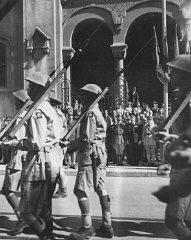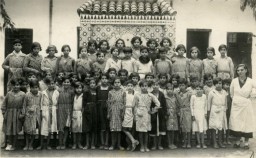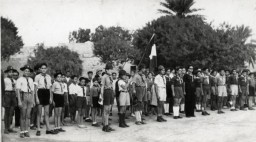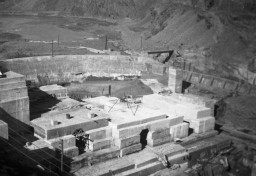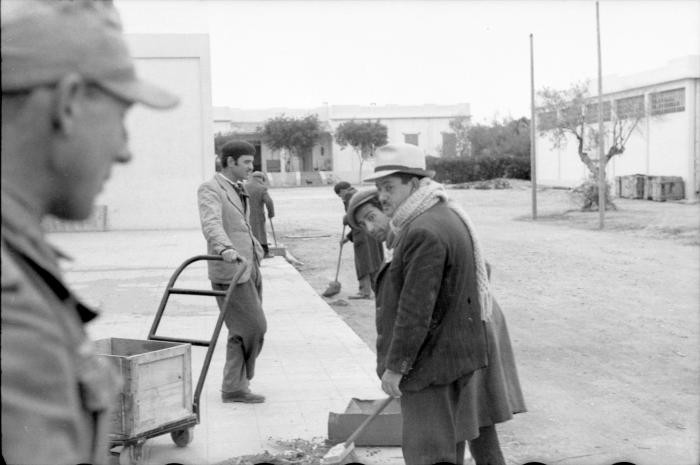
Anti-Jewish Legislation in North Africa
Long understood as a strictly European tragedy, the Holocaust’s reach extended far beyond the traditional boundaries of continental Europe to the Muslim world of North Africa. The Vichy regime introduced race laws to the North African territories in October of 1940. These laws were implemented variously across North Africa, as Vichy law interacted with pre-existing colonial law and wartime realities.
The French-German Armistice, signed on June 22, 1940, established a zone of German occupation in northern and western France and placed southern France under the rule of a new collaborationist government based in Vichy. The Vichy government, which would fall under the direction of Marshal Henri-Philippe Pétain, retained administrative control over France’s colonies in Asia and Africa, including colonial Algeria and the protectorates of Morocco and Tunisia. The Vichy regime introduced race laws to the North African territories in October of 1940. These laws were implemented variously across North Africa, as Vichy law interacted with pre-existing colonial law and wartime realities.
Although Algeria had been integrated into France since 1848, few Algerian Berber or Arab Muslims had been granted citizenship by the state: most of Algeria’s Muslims were therefore French nationals, but “indigenous subjects of France” rather than French citizens. Algerian Jews were placed in another legal category, as the 1870 Crémieux Decree had granted citizenship to most Jews in Algeria, excepting the small population of Jews in the military districts of the Sahara. By contrast, France exercised indirect rule over its protectorates, Tunisia and Morocco. In these cases, the French state wielded power through resident-generals, allowing local monarchs to hold nominal authority.
On October 3, 1940, the first anti-Jewish law (Le Statut des Juifs) was introduced in France. Modeled on the Nuremberg Laws, the Statut des Juifs offered a racial definition of Jews living in the metropole and in Algeria. Four days later, the Crémieux Decree was abolished by the initiative of the Vichy regime, and Algerian Jews were stripped of their citizenship.
In 1941, the Commissariat Général aux Questions Juives (The General Commission for Jewish Affairs, or CGQJ) was established under the leadership of Xavier Vallat. The Vichy regime tasked this commission with supervising the implementation of anti-Jewish policies in France, and with developing and implementing legislation to further the goals of this policy. The new legislation produced by this body, the Statut des Juifs of 1941, replaced the older order.
Jews in France, including Algeria, were now prohibited from working in any public capacity. Jewish employees were expelled from the military (save for a limited number of war veterans), from public administration, the civil service, and the teaching profession (they were allowed to continue offering instruction in Jewish schools, however). Jewish women and men were also barred from working in the media. A quota known as numerus clausus was imposed upon Jewish doctors, architects, lawyers, and notaries, limiting the number of Jews in each profession to two percent of the whole. Further numerus clausi barred Jews from engaging in finance or the extension of credit, which in turn prevented many from owning businesses. Additionally, the Vichy regime capped the percent of French Jewish students (including those in Algeria) at fourteen, eventually forbidding their access to public education altogether. The General Commission for Jewish Affairs applied these laws strictly in Algeria, negatively affecting many families who had assimilated into French Algerian society and culture.
Jewish communities in North Africa
Following the designation of numerus clausus, the Vichy authorities embarked upon the “Aryanization of Jewish property” under the Office of Economic Aryanization. In July 1941, new legislation authorized the confiscation of Jewish property. Jewish businesses in Algeria were allocated to non-Jewish “trustees” by the Office of Economic Aryanization, and new owners were permitted to manage, profit from, and even sell the businesses they were assigned. With the implementation of these and other antisemitic decrees, Algerian Jews were pushed to the margins of French colonial society.
The Jewish community of Algeria responded to these developments with resilience, supplying Algeria’s Jewish families with economic, medical, and educational resources. But the vise continued to tighten. On March 31, 1942, the Vichy authorities created a communal governing body known as Union Générale des Israélites d’Algérie. Like the Judenrats of German-occupied Europe, this body was meant to serve as a liaison between the Vichy authorities and the Jewish community, radically reducing communal autonomy.
In Morocco and Tunisia, anti-Jewish legislation took different shape, in dialogue with pre-existing colonial and protectorate law. Jews in the protectorates were considered Moroccan and Tunisian subjects of the sultan and bey, respectively, except for a minority who obtained French or Italian citizenship; and they, too, were subject to beylical and Makhzan legal authority. Under Vichy rule, the Statut des Juifs of 1940 allowed Jews in Morocco and Tunisia to retain their status as a religious group and did not consider them, legally speaking, as members of an inferior race. As a result, Jews in the protectorates were able to maintain their social and economic status at this stage of Vichy rule—even though numerus clausus were also imposed upon them. With the 1941 Statut des Juifs, a racial definition was applied to Moroccan and Tunisian Jewries, restricting their legal status further.
In Morocco, the application of Vichy racial laws was overseen by Resident-General Noguès, with the approval of Sultan Sidi Mohammed ben Youssef (Mohammed V). Here, preparation for Aryanization began with a census that counted persons, professions, and property. Yet, the Moroccan government used various tactics to delay the implementation of Aryanization, even if Moroccan Jews were subject to economic, educational, and administrative limitations and quotas. Anti-Jewish legislation also demanded the movement of Moroccan Jews out of European neighborhoods (the ville nouvelle)—neighborhoods to which Jews had moved in great numbers since the late nineteenth century—and into poor Jewish neighborhoods known as mellahs. This law was implemented selectively, with Fez being hardest hit. Here, the overcrowded mellah was a breeding ground for typhoid and other diseases, which caused Jewish mortality rates to soar.
Some of the anti-Jewish legislation (such as the barring of Jews from certain professions, and the implementation of the numerus clausus) adopted by the Vichy regime was implemented across Morocco’s cities and towns. However, this legislation did not have an acute affect upon large numbers of poor Jews who lived in Morocco. In the Moroccan hinterlands and rural margins, tribal lords were rarely instructed to enforce Vichy law. Additionally, Sultan Sidi Mohammed ben Youssef assumed a favorable position relative to his Jewish subjects. Thus Vichy laws bore the sharifian [sultanic] seal, even though the sultan frequently intervened to show his support to the Jewish community and its leadership. In other instances—for example, when the leadership of the Jewish community complained about food rations and oil and sugar shortages—the sultan called on local caids [tribal lords] to increase quotas, particularly during religious holidays.
When it came to the educational realm, Jews in Morocco and Tunisia did not feel the sting of Vichy antisemitic law as powerfully as did the Jews in Algeria. This was because the majority of Jewish students in the protectorates attended Alliance Israélite Universelle schools, and thus fell outside of the restrictions’ reach. What’s more, the limited assimilation of Jews in Morocco and Tunisia—at least relative to Algeria—minimized the impact of the numerus clausus, with the medical and legal professions feeling the effects most powerfully.
A final factor impinged upon the effectiveness of Vichy legislation in Tunisia. Here, the local leadership, including Resident General Admiral Jean-Pierre Estéva, Ahmed Pasha, and Moncef Bey, intentionally stalled anti-Jewish legislation. This was done despite the limited influence of the Bey, whose authority was restricted by the protectorate.
The Allied invasion of November 8, 1942 (Operation Torch) and the subsequent German and Italian invasion of Tunisia marked a turning point in the war in North Africa, and had myriad effects upon local Jews. Once in power in Tunisia, the German leadership applied racial and antisemitic policies to Tunisian Jews. Nazi policies now compelled Jews to wear the yellow star, dictated the confiscation of Jewish-owned property, drafted Jewish men into forced labor, and deported Jewish women and men to labor and internment camps in North Africa. Roughly a handful were sent to camps in occupied Poland. Additional unknown numbers of Tunisian, Moroccan, and Algerian Jews living within the borders of continental France were deported to the death camps as well.
The Italian authorities opposed the application of racial laws to Tunisian Jews who held Italian citizenship. However, in 1942 the Italian leadership deported from Libya Jewish holders of British passports. Interned first in concentration camps in Italy, these Jewish women and men were subsequently deported to Bergen-Belsen after Italy was occupied by Germany. The prisoners remained in Bergen-Belsen for six months before being liberated by Allied troops.
Across North Africa, Jews experienced the antisemitic legislation of the Vichy regime variously, depending upon their prewar legal status, the extent of their prewar acculturation, whether they lived in urban or rural locations, and the timing of war, among other factors. Though Vichy law was meant to have an impact on all of the region’s Jews, in actuality its effects were mottled, shaped by histories of colonialism as well as the realities of war and protectorate rule.
Series: North Africa
Critical Thinking Questions
- Learn about the diverse Jewish communities of North Africa before World War II.
- What was the relationship between German expansion and the fate of Jews in North Africa?
- Explore recent scholarship about the geographic extent of the Holocaust.
